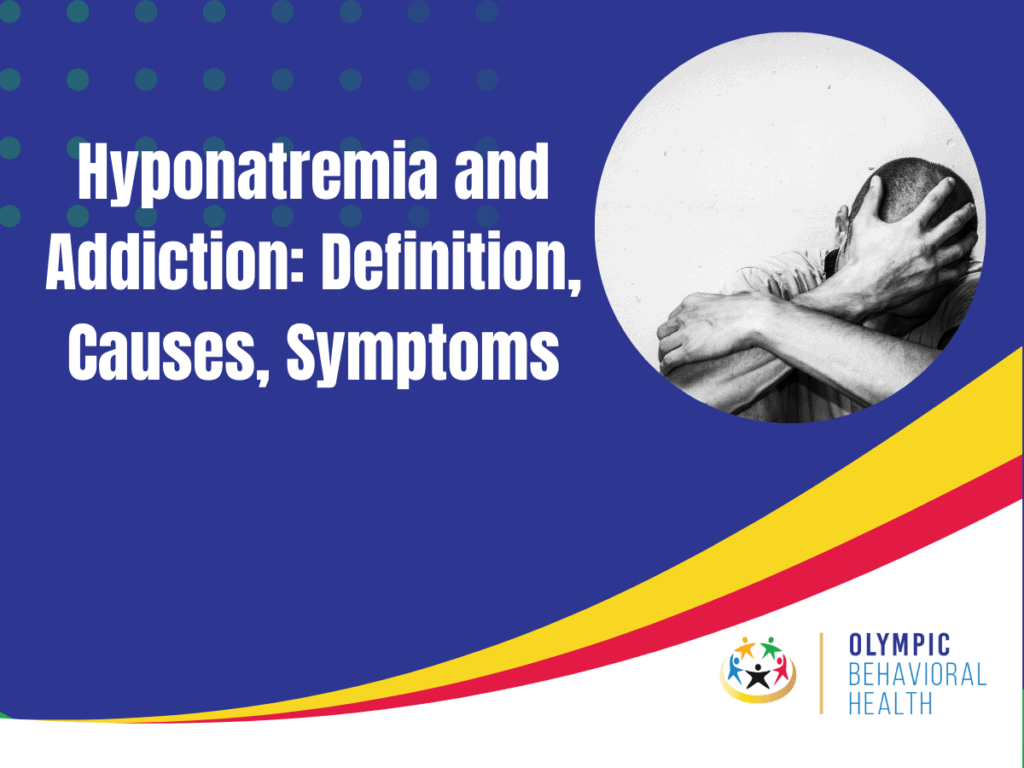Hyponatremia is a condition when the sodium levels in the blood are low. It is caused by various factors including medications, excessive fluid intake, hormonal imbalance, liver and kidney problems, and underlying health conditions like congestive heart failure, and syndrome of inappropriate antidiuretic hormone (SIADH). Symptoms include nausea, headache, muscle weakness, confusion, irritability, and in severe cases, seizure and coma.
Addiction, on the other hand, refers to a complex condition characterized by compulsive substance use or engagement in certain activities despite harmful consequences. Causes of addiction include genetics, brain chemistry, environmental factors, mental health disorders, and socio-cultural factors. People with addiction tend to present with cravings, loss of control, social and occupational impairment, physical dependence, and risk-taking behaviors. These people also continue using despite the harm.
There isn’t a direct causal relationship between hyponatremia and addiction, but they can interact and exacerbate each other’s effects, especially in cases where substance abuse contributes to electrolyte imbalances.

What is Hyponatremia?
Hyponatremia occurs when there is an abnormally low level of sodium in the blood. Clinically it is defined as a serum sodium concentration below 135 mEq/L. Hyponatremia is the most common electrolyte disorder.
Sodium plays a crucial role in maintaining normal blood pressure, regulating fluid balance in the body, and supporting nerve and muscle function. A reduction in sodium levels below healthy levels leads to red cell swelling among other clinical health problems like attention deficit, fractures, rhabdomyolysis, seizures, cerebral edema, respiratory arrest, and death in severe cases. These health problems vary in severity from mild to life-threatening.
What are The Causes of Hyponatremia?
In most cases, hyponatremia is caused by having too much water in the body leading to a dilution. Another major cause is the loss of sodium through urine or sweat. There are many other reasons for the imbalance between sodium and water levels in the body. Here are a few causes of hyponatremia.
- Excessive Fluid Intake: Drinking too much water, particularly during intense physical activity, without replacing the sodium lost through sweat.
- Medications: Certain medications such as diuretics, antidepressants, antiepileptics, and some pain medications, lead to hyponatremia as a side effect.
- Kidney Disease: People with acute kidney injury, kidney failure, and advanced stages of chronic kidney disease can’t effectively get rid of excess fluid from the body.
- Other Medical Conditions: Conditions like heart failure, Addison’s disease, pancreatitis, peritonitis, liver cirrhosis, and syndrome of inappropriate antidiuretic hormone (SIADH) disrupt sodium balance.
- Hormonal Imbalances: Overproduction of antidiuretic hormone (ADH) or adrenal insufficiency also affects sodium levels.
- Hypothyroidism: The chances of hyponatremia are increased by underactive thyroid function.
- Dehydration Followed by Overhydration: Losing fluids from vomiting, diarrhea, or excessive sweating followed by drinking large amounts of water without replacing electrolytes.
- Ecstasy: Ecstasy is an illicit drug in the amphetamine class that increases the risk of developing severe cases of hyponatremia.
- Excessive Diarrhea and Vomiting: Chronic diarrhea and vomiting result in excessive fluid and electrolyte loss.
- Excessive Alcohol Intake: Alcohol is a natural diuretic. It causes excessive urination and thus loss of electrolytes including sodium.
- Burns: Severe burns can result in hyponatremia

What are The Symptoms of Hyponatremia?
People with a mild version of hyponatremia do not usually have any symptoms. Symptoms usually occur when the sodium level is very low or the drop is acute. Some of the symptoms include the following:
- Nausea
- Headache
- Confusion and irritability
- Fatigue
- Muscle weakness and cramps
- Low blood pressure
People with severe cases of hyponatremia also witness the following symptoms:
- Severe confusion and an altered mental status.
- Hallucinations
- Seizures
- Coma
What is Addiction?
Addiction is a complex and chronic clinical condition characterized by compulsive substance abuse and engagement in activities with and despite the negative consequences. It is considered a brain disorder involving multiple factors, including genetic predisposition, environmental influences, and underlying neurobiological changes.
At its core, addiction involves a strong and often uncontrollable craving for the substance or activity, leading to a persistent pursuit of it, even when it interferes with daily responsibilities, relationships, and health. The brain undergoes significant changes in its structure and function due to repeated exposure to addictive substances or behaviors, which can result in a diminished ability to control impulses and make rational decisions.
What are The Causes of Addiction?
Addiction is a complex and chronic disorder, caused by a slew of factors. Some of the factors that lead to addiction include:
- Genetics: People with addiction tend to have first-level relatives with the same or similar addiction. This shows that genetic factors predispose individuals to addiction.
- Brain Chemistry: Repetitive consumption of addictive substances alters brain chemistry leading to changes in neurotransmitter levels and pathways associated with reward, pleasure, and motivation.
- Environmental Factors: Exposure to addictive substances and activities at an early age, peer pressure, stress, trauma, and socioeconomic factors contribute to the development of addiction.
- Mental Health Disorders: Addiction typically co-occurs with mental health issues such as depression, anxiety, or PTSD. This co-occurrence implies a connection between addiction and mental health disorders.
- Social and Cultural Factors: Cultural norms, societal attitudes toward substance use, and access to drugs or alcohol influence addictive behaviors.
What Are the Symptoms of Addictions?
According to the Diagnostic and Statistical Manual of Mental Disorders (DSM-5) published by the American Psychiatric Association, people with established cases of addiction typically present with the following symptoms:
- Cravings: Intense desire to use the substance or engage in said activity.
- Loss of Control: Inability to regulate substance use or participation in said activity, leading to abuse despite negative consequences.
- Physical Dependence: Development of withdrawal symptoms when the substance is not used.
- Social and Occupational Impairment: Negative impact on relationships, work, school, and other areas of life.
- Risk-Taking Behaviors: Engaging in risky activities to obtain or use the substance, disregarding personal safety.
People with addictions also continue using said substance or engaging in said activity despite awareness of its deleterious effects on their overall well-being.

Is There a Relationship Between Hyponatremia and Addiction?
Hyponatremia does not have a direct causal relationship with addiction; however, there seem to be a few indirect connections. Here are a few connections between these two conditions.:
- Dehydration and Fluid Intake: Excessive alcohol or drug consumption increases the chances of dehydration, which contributes to electrolyte imbalances, including hyponatremia.
- Medication Side Effects: Some medications used to treat addictions have side effects that affect sodium levels.
- Withdrawal Complications: Symptoms of substance withdrawal include vomiting, diarrhea, and profuse sweating. These complications lead to fluid and electrolyte imbalance.
Can addiction contribute to hyponatremia?
Yes, excessive alcohol or drug use contributes to dehydration, electrolyte imbalances, and conditions like SIADH, contributing to hyponatremia.
How does hyponatremia affect individuals with addiction?
Hyponatremia worsens health complications, as its symptoms imitate those of withdrawal or mental health issues, delaying diagnosis and treatment.
What role do medications play in hyponatremia and addiction?
Some medications for addiction or mental health affect sodium levels or cause electrolyte imbalances, influencing the risk of both conditions.
Are there specific treatment considerations for those with hyponatremia and addiction?
Treatment should address both conditions simultaneously, adjusting medications, providing electrolyte replacement therapy, and monitoring fluid intake carefully.
How can individuals prevent hyponatremia while managing addiction?
Prevention involves avoiding excessive fluid intake, especially during physical activity or substance use, and maintaining a balanced diet with adequate sodium intake. Regular medical monitoring is also crucial.
What types of addiction are there?
There are various types of addiction, including substance addiction (drugs, alcohol, tobacco), behavioral addiction (gambling, video games, shopping), and food addiction. These addictions can have serious physical and psychological effects, and often require professional treatment and support to overcome. It is important to seek help if you or a loved one is struggling with any type of addiction.
What role do neurotransmitters play in addiction?
Neurotransmitters play a crucial role in addiction as they are the chemical messengers responsible for communication between neurons in the brain. In the case of addiction, the neurotransmitters dopamine and serotonin are heavily involved. Dopamine is associated with feelings of pleasure and reward, making it a key player in the development of addictive behaviors.
Serotonin, on the other hand, is responsible for regulating mood and emotions, and its dysfunction has been linked to impulse control issues and substance abuse. Both of these neurotransmitters play a major role in reinforcing addictive behaviors and creating a cycle of dependence. For more information on the effects of neurotransmitters in addiction, check out our article.
Get help for your Addiction
Addiction Treatment at Olympic Behavioral Health offers help and support for those struggling with addiction. Taking the first step can be difficult, but it is crucial to call for assistance. Our facility in West Palm Beach provides comprehensive addiction treatment programs to guide individuals towards recovery. If you or your loved one is battling addiction, reach out to Olympic Behavioral Health today.

Share This Post



